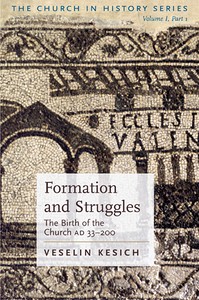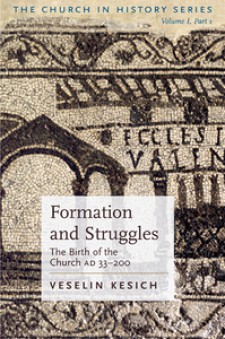
FALL ADULT EDUCATION CLASS 2013
Thursday evenings beginning November 7.*
Schedule may change; see below or call office during regular hours.
Formation and Struggles: The Birth of the Church, AD 33-200
by Veselin Kesich
We have an excellent book chosen for this year's class: Formation and Struggles by Veselin Kesich. Professor Kesich, one of my former teachers at St. Vladimir's Orthodox Theological Seminary, has written a wonderfully informative historical study of the Church's first two centuries.
- What was so immediately compelling about the Gospel message of Jesus Christ?
- How and to what extent did the Church expand in its initial days?
- What was the relationship between Jews and Gentiles in the one Church of Christ?
- What obstacles had to be overcome? To what extent did the earliest Christians face persecution?
- What was the linguistic, social, cultural, religious and political context of early Christianity?
- What were the main beliefs and practices of our spiritual ancestors?
- Following the apostles, who were some of the great figures of early Christianity?
All of these important questions and much more are covered by Prof. Kesich in his highly accessible book.
Formation and Struggles is available from St. Vladimir's Seminary Press and, of course, through amazon.com for under $20.00.
— Fr. Steven
SCROLL DOWN FOR CLASS NOTES . . .
Dear Parish Faithful,
Completing the Fall Adult Education Class
Due to my earlier illness, we did not fit in all six sessions of this year's Fall Adult Education Class. So, we will meet for the sixth and final session on Thursday evening, January 9. We will discuss the threat that Gnosticism posed to the Church in the early centuries. The Gnostic heresy is very much alive today in various guises, so this should be quite an interesting discussion.
We will also discuss the contribution of the Church's first great biblical theologian, St. Irenaeus of Lyons and his response to the Gnostic threat. We will begin at 7:30 p.m. in the Education Center.
Thursday, December 19, 2013
7:00PM - Vespers for the Prefeast of the Nativity
7:45PM - Session V of our Fall Adult Class
Dear Parish Faithful,
At 7:00 p.m. this evening we will serve the Vespers of the Prefeast of the Nativity during which we begin to sing and chant the hymnography leading up to the Feast on December 25.
Following the service, at 7:45 p.m. we will begin Session V of our Fall Adult Education Class. We will discuss ch. 9 & 10 from Prof. Kesich's book, respectively "Persecution and Martyrdom: The Testimony of Blood;" and "Christian Apologists: The Testimony of the Writings." The chapter on martyrdom is quite fascinating, inspiring and bit intimidating. We will discuss the most well-known of the early Church and their willingness to give their lives rather than renounce their faith in Christ when threatened by the Roman authorities.
Here are a few questions to think over before this evening's class:
- What kind of threat did the early Christians pose to the Roman authorities?
- What did Tertullian - the 2nd c. North African writer - mean when he said that "the blood of the martyrs is the seed of the Church?"
- Can we discover a "theology of martyrdom" based on the testimony of these great martyrs?
- What is the greatest age of Christian martyrdom in the history of the Church?
In turning to ch. 10, a question or two might be:
- What, precisely, is an apologist?
- What is the aim of an apologetic treatise?
- Are there any contemporary Christian apologists?
Another exciting evening awaits us! Be there or be nowhere!
~ Fr Steven
Fall Adult Education Class
Thursday, December 12
- 7:00pm - Vespers (St Herman)
- 7:45pm - Class begins
Dear Parish Faithful,
[Tonight] we will serve Vespers at 7:00 p.m. in order to commemorate St. Herman of Alaska, one of our American saints.
The service will be followed by Session IV of our Fall Adult Education Class at "around" 7:45 p.m. We have missed a couple of weeks, so by way of reminder we will now discuss Ch. 7 & 8 in the Kesich book, Formation and Struggles. These are two more chapters filled with some fascinating material that continues to explore the early decades of the Church.
Ch. 7 is entitled "The Rift Between Christians and Jews." Subtopics within this chapter - together with some questions - are:
- The Destruction of the Temple - Why and when did this horrific event occur? What were the consequence of this event for Christian and Jewish relations?
- Tensions Reflected in the Gospel of Matthew - What is the purpose of the intense criticism directed at the Pharisees by Jesus?
- The Evangelist John and Anti-Jewish Polemic - Does this polemic ever become Anti-Semitic?
- The Second Jewish War - Where and when did this occur? How did this further exacerbate tensions between Christians and Jews?
- The Letter to the Hebrews and Roman Christians - What are some of the reasons behind this letter's purpose for being written? What does it say about Christian - Jewish relations?
- The Christian-Jewish sects - Why were these groups eventually seen to be outside of the authentic Gospel Tradition? What did they teach about Christ?
A few more contemporary questions may be the following: If you have a Jewish neighbor/acquaintance and were asked by him/her to explain why you are a Christian, how would you respond? What would you say to somehow legitimize the New Testament messianic claims about Jesus to such an acquaintance? If your Jewish friend asked about the alleged anti-Semitism of the New Testaments how would you respond?
Ch. 8 is entitled "New Christian Centers: Rome, Antioch and Alexandria."
Without breaking down this chapter as specifically at the moment, we could ask some general questions:
- Why were these cities so important for the spread of the Gospel?
- What are some of the more specific characteristics of each city's particular local church that made it stand out? Why did Rome become so central?
- Why is the post New Testamental literature of this somewhat later period so important in the formation of the Church's theology and teaching?
- Have you read any of this literature? If not, what works seem to attract you the most from Prof. Kesich's short descriptions?
A great deal of exciting material to cover! As the class is beginning its second half, please join us as a new member!
Dear Parish Faithful,
The second session of this year's Fall Adult Education Class is scheduled for Thursday evening, November 14, at 7:30 p.m. in the Education Center. (We will not have a Vespers service before the class this week).
It will be a bit of a challenge, but we will try and cover Ch. 2 - 4 in Prof. Kesich's book. I hope to see the same group return from last week, together with some new faces. Anyone and everyone is free to join us whenever they are willing and able.
Ch. 2, "The Birth of the Church in Jerusalem," contains the history of the earliest Church and the struggle for its survival and growth. We will concentrate on the relationships between Jews and Gentiles in these early decades. What characterized the life of the earliest church in Jerusalem? What practices are still within the Church to this day?
Ch. 3, "The Expansion of the Church Beyond Jerusalem," will take the Church beyond the borders of Palestine into Gentile territory. What was behind these early encounters? What does that teach us for Christian mission today?
Ch. 4, "The Church's Encounter With Syncretism," will make the point of demonstrating just how difficult it was for the Church in proclaiming Christ amidst a myriad of conflicting and competing religions and philosophies. Just like today! We will discuss the challenges of syncretism for the early Church and the Church today.
I look forward to seeing everyone! Bring your friends, your neighbors, your co-workers, your relatives - and your co-parishioners!
Fr. Steven




